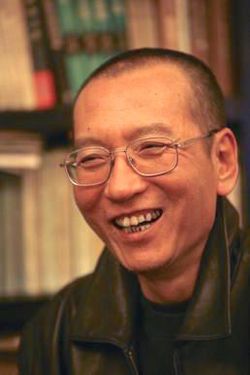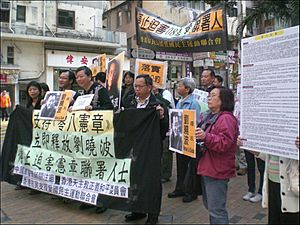Liu Xiaobo facts for kids
- This is a Chinese name; the family name is Liu.
Quick facts for kids
Liu Xiaobo
|
|
|---|---|

Liu Xiaobo (2008)
|
|
| Born | 28 December 1955 |
| Died | 13 July 2017 (aged 61) |
| Cause of death | Multiple organ failure complicated from liver cancer |
| Nationality | Chinese |
| Alma mater | Jilin University Beijing Normal University |
| Occupation | Writer, political commentator, human rights activist |
| Spouse(s) | |
| Awards | 2010 Nobel Peace Prize |
Liu Xiaobo (born December 28, 1955 – died July 13, 2017) was a Chinese writer, teacher, and a strong supporter of human rights. He was also a political prisoner in China.
He led the Independent Chinese PEN Center starting in 2003. This group works to protect writers' freedom of speech. In 2008, police stopped Liu because of his work on something called Charter 08. He was officially arrested in 2009. The government said he was trying to make people turn against the state. He had a trial and was sent to prison for eleven years. He also lost his political rights for two years.
Liu Xiaobo won the Nobel Peace Prize on October 8, 2010. He won it for his "long and non-violent struggle for basic human rights in China." This happened while he was in prison for the fourth time.
He was the first Chinese person to win a Nobel Prize while living in China. He was also one of only three people to win the Nobel Peace Prize while in prison. The others were Germany's Carl von Ossietzky (in 1935) and Myanmar's Aung San Suu Kyi (in 1991).
In June 2017, he was allowed to leave prison for medical reasons. Doctors had found that he had a serious illness called liver cancer. He sadly passed away a few weeks later on July 13, 2017.
Contents
Early Life and Education
Liu Xiaobo was born in 1955 in Changchun, Jilin province, China. His family were intellectuals, meaning they valued learning and ideas. When he was young, from 1969 to 1973, he lived in Inner Mongolia as part of a government program. Later, he worked in a village in Jilin province and then at a construction company.
In 1976, he started studying at Jilin University. He earned a degree in literature in 1982. He then went to Beijing Normal University and got a master's degree in 1984. After graduating, he became a teacher at Beijing Normal University. He also earned his Ph.D. there in 1988.
In the 1980s, Liu became well-known for his writings. His essays, like Critique on Choices and Aesthetics and Human Freedom, made him famous in academic circles. He often shared his thoughts on important ideas and challenged existing philosophies.
From 1988 to 1989, he visited universities in other countries. These included Columbia University in the U.S., the University of Oslo in Norway, and the University of Hawaii in the U.S.
During the 1989 Tiananmen Square protests, Liu was in the United States. However, he decided to return to China to join the student movement. He was later called one of the "Four Junzis of Tiananmen Square" by some media.
Fighting for Human Rights
Liu Xiaobo worked hard to improve human rights in China. He often asked the Chinese government to be more open and fair. Because of his peaceful activities, the Chinese government arrested him and sent him to prison many times. His first arrest was for his actions during the Tiananmen Square protests of 1989.
Groups outside China recognized Liu's work for human rights. In 2004, an organization called Reporters Without Borders gave him an award. It was the Fondation de France Prize, given to people who defend freedom of the press.
His Time in Prison
Liu Xiaobo spent many years in prison because of his peaceful actions. Here is a summary of his time in prison:
| Time in Prison | Reason | Outcome |
|---|---|---|
| June 1989 – January 1991 | Accused of spreading ideas that could lead to a revolution. | Held in Qincheng Prison, a high-security prison. Released after signing a "letter of repentance." |
| May 1995 – January 1996 | Involved in democracy and human rights movements. Spoke publicly about government mistakes during the 1989 student protests. | Jailed for six months, then released. |
| October 1996 – October 1999 | Accused of causing public disorder. | Sent to a labor camp for three years. He married Liu Xia in 1996. |
| December 2009–2020 | Accused of trying to change the country's system and authority. | Sentenced to 11 years in prison and lost political rights for two years. He was held in Jinzhou Prison in Liaoning Province. |
What Was Charter 08?
Writing and Sharing Charter 08
Liu Xiaobo played a big part in writing Charter 08. This was a special document, like a statement of beliefs. He and over 300 other Chinese citizens signed it. It was released on December 10, 2008. This date was also the 60th anniversary of the Universal Declaration of Human Rights.
The Charter was written like the Czechoslovak Charter 77. It asked for more freedom to speak, more human rights, and fair elections in China. By May 2009, more than 8,600 Chinese people from different backgrounds had signed the Charter.
His Arrest and Trial
Police took Liu Xiaobo from his home on the evening of December 8, 2008. This was just two days before Charter 08 was officially released. Another scholar who signed the Charter, Zhang Zuhua, was also taken. Police believed Liu and Zhang were trying to get more people to sign the Charter.
Liu was held alone and could not see his lawyer or family. He was allowed to have lunch with his wife, Liu Xia, on New Year's Day 2009, but two policemen were also there. On June 23, 2009, a government official in Beijing approved Liu Xiaobo's arrest. He was accused of "inciting subversion of state power." This means trying to peacefully change the government system. The police said Liu had "fully confessed."
On December 1, 2009, Liu's case was sent for investigation. On December 10, he was officially accused of "inciting subversion of state power." His trial took place on December 23, 2009, at a court in Beijing. His wife was not allowed to watch the trial. Diplomats from over 12 countries were also not allowed inside. Some of them waited outside the court during the entire trial.
His Sentence and Time in Prison
On December 25, 2009, Liu Xiaobo was sentenced to eleven years in prison. He also lost his political rights for two years. The court said that Charter 08 was proof that he was guilty.
Liu Xiaobo believed the government had broken China's own rules and the Universal Declaration of Human Rights by putting him in prison. He said he had not spread lies or hurt anyone's reputation. He had only shared his own ideas and values.
The Nobel Peace Prize
Why He Won the Prize
On January 18, 2010, many important people suggested Liu Xiaobo for the 2010 Nobel Peace Prize. These included Václav Havel, the 14th Dalai Lama, and Desmond Tutu. China's government said that giving the prize to Liu would be "totally wrong." However, the Nobel Committee said they would not let China's opinion change their decision.
In September 2010, Václav Havel and others wrote an open letter asking for Liu to receive the award. Soon after, people started signing a petition to support him.
A group called Freedom Now, which helps Liu Xiaobo, shared a letter from 30 U.S. politicians. They asked President Barack Obama to talk to China's President about Liu Xiaobo.
On October 8, 2010, the Nobel Committee gave Liu the Prize. They said it was "for his long and non-violent struggle for fundamental human rights in China."
China's Reaction
News about Liu Xiaobo winning the Nobel Prize was immediately blocked in China. Foreign news channels like CNN and the BBC were stopped from broadcasting in China when they mentioned the award. Information about Liu Xiaobo was also removed from Chinese websites.
The Chinese Foreign Ministry said that Liu Xiaobo was a criminal who had broken Chinese law. They said that giving him the Peace Prize went against the purpose of the award. They also said it might hurt relations between China and Norway.
Awards He Received
Liu Xiaobo received many awards for his work:
- Hellman-Hammett Grant (1990, 1996)
- China Foundation on Democracy Education (2003): Outstanding Democratic Activist
- Fondation de France Prize (2004): Award for Defending Freedom of Speech
- Hong Kong Human Rights Press Awards (2004, 2005, 2006)
- Homo Homini Award (2009)
- PEN/Barbara Goldsmith Freedom to Write Award (2009)
- Hermann Kesten Award (2010)
- Nobel Peace Prize (2010)
His Family and Later Life
Liu Xiaobo was married to Liu Xia. She lives in their apartment in Beijing.
In May 2017, doctors found that Liu had a very serious illness called liver cancer. On July 10, 2017, he was in critical condition at a hospital in Shenyang.
Liu Xiaobo passed away at the hospital in Shenyang, Liaoning, China, on July 13, 2017. He was 61 years old. He died from multiple organ failure, which was a complication of his illness.
See also
 In Spanish: Liu Xiaobo para niños
In Spanish: Liu Xiaobo para niños
Images for kids
-
Polish mural in Warsaw, reading "Solidarity with Liu Xiaobo"
-
March in memory of Liu Xiaobo in Hong Kong
 | Valerie Thomas |
 | Frederick McKinley Jones |
 | George Edward Alcorn Jr. |
 | Thomas Mensah |




